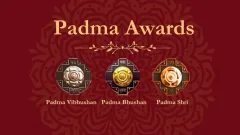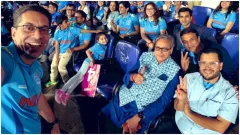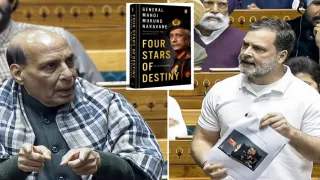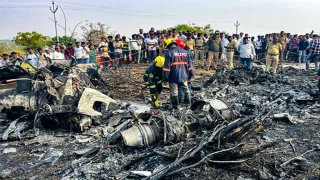Who is Hamida Bano, Google is paying tribute to her by making a doodle
Google Doodle has paid tribute to India's first female wrestler Hamida Bano, who challenged gender stereotypes in the 1940s and 50s. Her remarkable journey paved the way for women in sports.Google Doodle Today
In celebration of women's achievements, Google Doodle today on May 4, 2024 remembers Hamida Bano, a pioneering Indian female wrestler who overcame barriers to enter the male-dominated world of wrestling in the 1940s and 50s . Known as India's first professional female wrestler, Banu's journey to fame was remarkable

According to a BBC Report in February 1954, when Banu was 30, she announced that any man who could defeat her in wrestling would marry her. He then defeated two men's champions, one from Patiala and the other from Kolkata. For her third match that year, she went to Vadodara, where she faced Baba Pehalwan after another male wrestler had withdrawn his name refusing to face a woman. Banu won this match in just 1 minute 34 seconds.
Banu had earned a tremendous name in a decade. In 1944, he reportedly attracted a crowd of 20,000 people to watch him fight a mute wrestler in Mumbai. Although the bout was canceled due to opponent's demands, Banu continued to attract public attention. Newspapers dubbed her the "Amazon of Aligarh" after her hometown in Uttar Pradesh, the BBC reported.
In a match held in Mumbai in 1954, Banu reportedly defeated Vera Chistilin, known as the "Lady Bear" of Russia, in less than a minute.Hamida Bano Physical fitness and rigorous training often made headlines. According to a BBC report, Banu, who stood 5'3" (1.6 m) tall and weighed 108 kg, reportedly had an extravagant diet – 5.6 liters of milk, 1.8 liters of fruit juice, 2.8 liters of soup, about 1 Kilo of mutton and almonds, one chicken, two large rotis, 500 grams of butter, 6 eggs and two plates of biryani – supplementing his nine-hour sleep and six-hour training schedule every day.
Hamida Bano Career
Hamida Bano career was surrounded by controversies. Some claimed that his encounters were pre-arranged, while others criticized him for challenging social norms. A match against Ramachandra Salunkhe had to be canceled following objections from the local wrestling federation, and once he defeated a male wrestler, a crowd threw stones at him and jeered him, the BBC reported.

Academician Ronojoy Sen, in his book 'Nation at Play: A History of Sport in India', writes, The distinction between sport and entertainment in these competitions is made clear by the fact that after Banu's bout, the contest between the two wrestlers One of them was lame and the other was blind.
Hamida Bano personal life was equally full of turmoil. Quoting her grandson Firoz Shaikh, the report said that Banu's coach Salam Pehalwan had tried to stop her from going to Europe by breaking her hands. His neighbor Rahil Khan told the BBC that his legs were also fractured after the attack. She wasn't able to stand. It got better later, but she couldn't walk properly for years without a stick.
After this incident, she disappeared from the wrestling scene and lived in Kalyan, where she earned a meager living by selling milk and snacks until her death in 1986. According to Sheikh, his last days were difficult.























